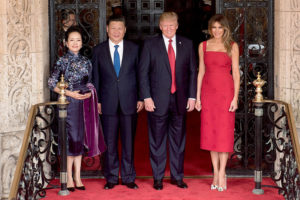
President Donald Trump and First Lady Melania Trump pose for a photo with Chinese President Xi Jingping and his wife, Mrs. Peng Liyuan, Thursday, April 6, 2017, at the entrance of Mar-a-Lago in Palm Beach, FL (Official White Photo by D. Myles Cullen)
At The National Interest, Samuel Rines calls the U.S. China trade dispute, a way to “restart history,” or “a return of economic and governance ideologies battling for supremacy.” He writes (abridged):
Many have assumed the United States and China would work out a trade deal. The tariffs and threats of further tariffs on Chinese exports to America—and the reciprocal tariffs on U.S. goods shipped to China—were simply part of the negotiating process. It would all get sorted out quickly, and world trade would adjust to the new rules ironed out between the economic giants.
But a funny thing happened on the way to a trade deal—it fell apart in spectacular fashion. Instead of a relaxation of economic hostilities, the conflict escalated with the Trump Administration potentially placing tariffs on essentially all goods from China.
While it is tempting to frame this trade conflict in the context of America becoming tiresome of the treatment of its businesses, this does not capture the true nature of the dispute or its entrenchment and longevity. This is a “restarting of history”—a return of economic and governance ideologies battling for supremacy.
What are the consequences of history restarting? Foremost, the United States has found its new enemy in China’s brand of social and economic regimes. This does not necessitate a “Cold War” between the United States and China, but the clashes over trade and economic conduct are simply indications of far more ingrained issues.
Washington and Beijing’s actions on trade and the escalation of economic tensions should not be underestimated. This is not a short-lived fight for “fairer” trade. It is a fundamental battle of ideologies. A wave of illiberalism and a controlled version of pseudo-capitalism is challenging capitalism and democracy as the model for the world to follow. The guise of economic gains and not “losing” anymore is being used to restart history—if it ever truly ended.
Read more here.
If you’re willing to fight for Main Street America, click here to sign up for my free weekly email.




